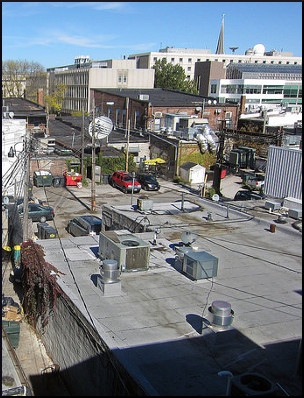
In Iowa City, Iowa, Shelter House helps hundreds of people every year, not only with a place to stay, but with job training and placement. Participants in case management have opportunities to work toward job readiness and employability.
The on-premise computer lab offers workshops in basic computer skills, as well as guidance in applying for housing and food assistance. The job and housing databases are packed with information, and help is available to create a resume.
There are two internal employment services. Fresh Starts is the professional janitorial service, whose workers are employed by area businesses. In the Culinary Starts paid internship program, people learn kitchen and culinary vocabulary, recipe manipulation, menu production, how to use kitchen equipment, and much more.
The website says:
Successful participants will become Servsafe certified and equipped to work in a variety of food service and restaurant settings. The proceeds from our contracted and catered meals go directly towards the food production program and Shelter House’s mission of helping people move beyond homelessness.
In the nation’s capitol, the Transitional Housing Programs for Men who are Homeless are administered by the D.C. Coalition for the Homeless. Six houses of different sizes are home to between 12 and 100 men in various stages of readiness to enter the working world. Some concentrate more on basic supportive services and life skills to prepare for self-sufficiency.
One is the Emery Work Bed Program, described as…
[…] specifically tailored to the needs of homeless men who are employed or in job training… The primary objective is to assist men in sustaining employment and moving into permanent housing. Program participants must be willing to accept case management services, meet with case management staff weekly and develop and follow an Individualized Service Plan.
Eastway Behavioral Healthcare is a private nonprofit mental health agency in Montgomery County, Ohio. In an unprecedented partnership with the county’s homeless service providers and their federal HUD funding, Hope Housing was created.
Eastway’s Laura Ferrell says:
You can’t find a job, you can’t become a productive member of society, you can’t make sure you get all of your medications and keep all of your doctor’s appointments if you don’t know which doorway you might be able to sleep in tonight.
Director Kathy Lind told journalist Thomas Gnau that most of the clients have “a lot of barriers, like mental health or substance abuse, criminal records.” Nevertheless, the time between referral and placement has been as short as 45 minutes. When the residents are ready to go out on their own, the Eastway staff reports, remarkably, “no shortage of landlords who have been willing to work with the program.”
The compassion and conviction are rooted in a hard-headed awareness that helping people get on their feet is a bargain compared to the expenses they could potentially rack up in the form of ER visits, hospitalizations, jail rent, or even such contingencies as winning a lawsuit against the city for one of the injuries that people experiencing homelessness often suffer at the hands of law enforcement.
Hope Housing operates under the “Housing First” model, and, in three years, 48 people have gotten their lives on track and found permanent housing, so it must be doing something right.
Reactions?
Source: “Job Training,” ShelterHouseIowa.org, undated
Source: “Transitional Housing Programs for Men who are Homeless,” DCCFH.org, undated
Source: “Program helps get homeless off streets, into jobs,” MyDaytonDailyNews,com,12/26/16
Photo credit: Alan Light via Visualhunt/CC BY


